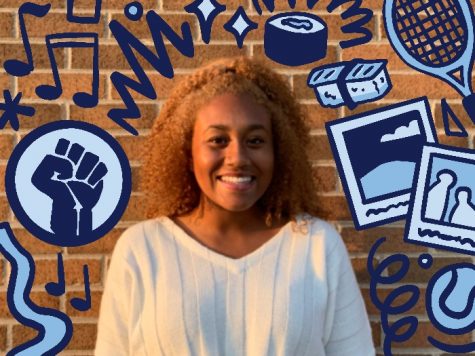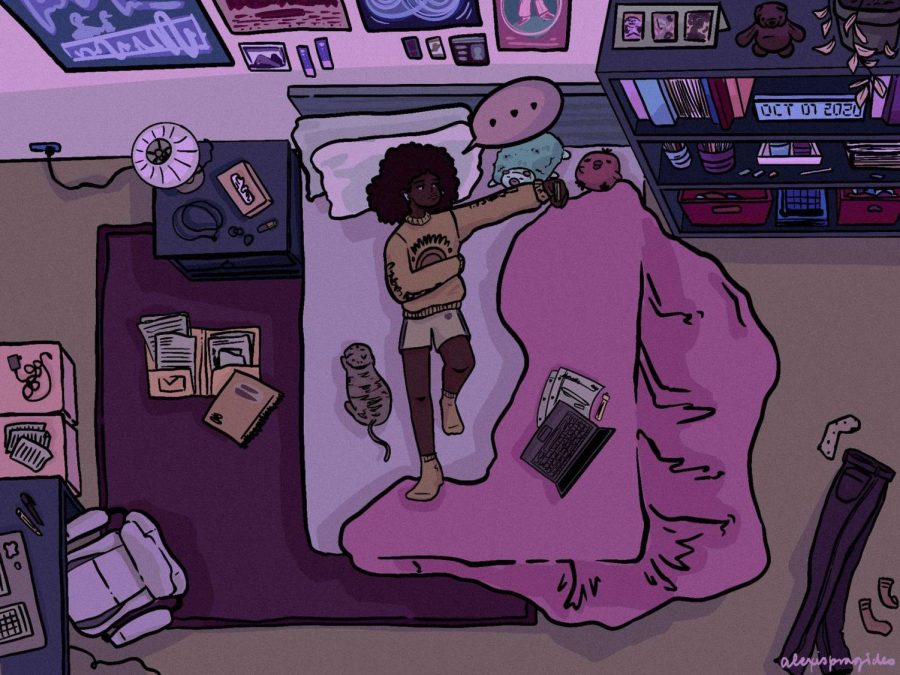Mentally over COVID: The struggles of mental health during a pandemic
Everyone is battling their own mental health struggles alone. We have to make sure we find what makes us happy and keep a positive atmosphere for each other.
A teenage boy sits in his room for 201 days and counting, he feels as if he cannot even remember his life before the pandemic. Rotting away as his only social interactions occur through his phone and computer, he feels the impacts of severe loneliness. This same phenomenon is occurring throughout the country as a result of COVID-19 health.
For high school students especially the impact is severe. Between school work, activities, personal relationships and becoming a young adult there is a lot for a young growing mind to handle. Senior Kaliah Alexander describes how her mental health was impacted at the start of COVID-19.
“I personally struggled with my anger a little bit for a little while. And then once I got over that, I would sit with myself a lot and just think and realize the things I needed to do and how I needed to start getting my life together because I was growing up. It was just a really rocky road honestly,” Alexander said.
Everyone is reacting and handling this pandemic very differently. For some fear and worry about what might happen financially, health and relationship wise can have a lot of one’s body and mind.
According to the CDC, “Stress during an infectious disease outbreak can sometimes cause the following: changes in sleep or eating patterns, difficulty sleeping or concentrating, worsening of chronic health problems, worsening of mental health conditions, increased use of tobacco, and/or alcohol and other substances.”
With such a negative response, mental health issues can start to arise throughout our society. New findings from the CDC prove there is an increase of mental and behavioral health issues that are being associated with this pandemic.
The report noted, “Markedly elevated prevalences of reported adverse mental and behavioral health conditions associated with the COVID-19 pandemic highlight the broad impact of the pandemic and the need to prevent and treat these conditions.”
This impact is evident in today’s high school students. Junior Gabrielle Hewawissa, DGS Varsity tennis player, explains her mental health struggles in the beginning of the pandemic.
“At the beginning of Covid, all the emotions I kept bottling up were getting worse because of how much time I spent alone. My friends every now and then would check in on me like I do for them, but I always lie so they think I’m fine. It eventually blew up and I took out all my anger on my family and myself. I stayed in my room most of the time feeling sad and I had no idea why,” Hewawissa said.
As a teacher the issue starts to become even more challenging; dealing with the navigation of a new teaching norm, teaching students who are struggling with their own personal affairs, and as a teacher, possibly a parent, coping with your own affairs. English teacher Riley Love discusses her opinion of the school’s assistance in adjusting to this new teaching norm and what she continues to do to support her students.
“While I don’t feel totally prepared, and I feel like I am learning a lot as I go, I also feel like our school district did a lot to get us as prepared as we could be. I feel like we have a lot of resources and we’re just lucky. We already had one to one, not a lot of school’s kids had that. We already had planned for snow days to be able to do remote learning, google classroom, all of those kinds of things were really helpful… So I yes and no, I mean yes to the extent that it could be. Sometimes I think what they think we might need is a little different then what we need but I do think they are attempting to give us what we need,” Love said.
Love continues: “The biggest thing that I feel like I have done is slow down what we are doing with the curriculum so that people don’t feel rushed and feel like we have to do it all, all the time… tried to check in with them, tried to listen to what they needed, what was working and what wasn’t. Sent out a lot of surveys to get feedback on what we should keep doing what we should get rid of…We tried to do a lot of SEL (Social Emotional Learning) even without this, a lot of meditation and questions of the week and different things to make us feel connected to each other,” Love said.
Battling to cope with her own mental health struggles as a parent and teacher, Love explains what she went through this summer.
“Honestly this summer I had a hard time sleeping, I’d stay up till four in the morning then I’d kind of sleep in and everything just felt weird. The only other time I felt like that or acted like that is the summer that my brother died, when he was killed in an accident with a truck that we had no expectation of. And that for me is this depression in tail spin, and that is what I kept realizing I felt like during quarantine and during the summer is when Ryan died. Where all of my scheduling, all of my plans I was just like screw it whatever the world just sucks,” Love said.
In the midst of battling this issue, everyone is trying to figure out their own coping mechanisms. Some use music other’s have calls with friends. Alexander explains what she has found to be helpful during this hard time and her advice for other’s dealing with this issue.
“Mainly I just played my game and I started to focus on my future more and what I am going to do. Then I was talking to my friends and we were talking about everything. When I would go see my family it would be 10 times better than seeing my friends. And then once school started back it gave me more structure then like not having anything to do all the time everyday,” Alexander said.
Alexander continues: “If you feel like you can’t take it then you should go to therapy, honestly because having someone else to talk to really helps. Especially if you feel like you can’t talk to your parents or your parent or even a sibling. Having an outside speaker speaking about what they see you going through or like what they feel you going through really helps,” Alexander said.
We all have our struggles and during this time it is good to make sure you take care of yourself. At such a sensitive time we need to focus on our happiness and feed our minds with positivity. If you or anyone else is in need of mental health assistance just know you are not alone and can always find help.
Please visit: https://www.nimh.nih.gov/health/find-help/index.shtml for more information.


